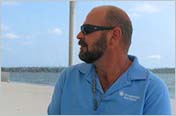MasterVoices, guided by artistic director and conductor Ted Sperling, have been devoting their season to streaming Adam Guettel’s “Myths and Hymns” and the third of the theatrical song cycle’s four parts, “Chapter Three: Love,” to which one might add sorrow, was introduced on April 14. Orchestrations were by Don Sebesky and Jamie Lawrence and choral arrangements were by Sperling.
The MasterVoices open the chapter with “Lonely,” a soft a cappella vocalise, leading directly into “Hero and Leander,” a beautiful, melismatic, and yearning love song, sung with passion and authority by Cheyenne Jackson, with a recurring refrain of “My lighthouse on the shoreline/My passion on this lonely sea,” the song punctuated by images of that light and sea. Sperling was the director.
Singer Victoria Clark directed “Come to Jesus,” both pleading phone message, meant to prevent a breakup, and prayer, gorgeously voiced by Shereen Pimentel, on a rocky shore. Drew Gehling’s response seems to be sung from a deserted airport waiting room, but then he joins her on the beach and, after some uncertainty and hesitation, their peace is made.
In “Medusa,” the MasterVoices back up baritone John Brancy, as Perseus, Zeus’ son, smoothly and lyrically explaining his mission to behead the Gorgon, Medusa, and the protagonist’s sisters, Lori Wilner, as Stheno, and Dianne Drayse Alonso, as Euryale, jazzily telling us what Gorgons do. They bring Medusa, Nina Bernstein, to what they think will be a solution to her lamentable loneliness, which they share. Instead, they unwittingly lead her directly into Perseus’ trap. Visual artist Earl Womack created the battle images and scenes of the serpent-haired sisters’ lives and Medusa’s swift execution.
“Love” concludes with Dove Cameron’s quiet, folk song-like lament for a love who has left.
“Myths and Hymns” is available at MasterVoices YouTube channel, at
https://www.youtube.com/channel/UCHzzgKoznWlft02x_3S5l_Q. “Chapter Four: Faith” will air on May 26.














